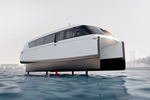Candela C-8 hydrofoil boat marks record trip across the Baltic
The electric vessel, claimed to be the first to cross the Baltic Sea, cuts traditional refueling needs in half, achieves 95% less operating costs, during the 150-nautical-mile journey.
Candela’s (Stockholm, Sweden) zero-emissions hydrofoiling electric boat, the Candela C-8, has reportedly become the first electric vessel to cross the Baltic Sea, journeying between Stockholm, Sweden and the Finnish autonomous region of Åland. The design and manufacturing principles for the vessel is similar to the composites-intensive versions of Candela’s other boat series (see “Composites enable novel flying speedboat,” “...composite hydrofoils to enable “world’s fastest” electric ferry”).
The trip was made on Sep 5, 2024, in the latest version of the leisure boat Candela C-8, equipped with a Polestar (Torslanda, Sweden) battery and charged by charging solution provider Kempower (Finland), starting at 6 a.m. After a charging stop in Kapellskär, they reached Mariehamn, the capital and largest town of the Åland Islands, an autonomous region of Finland, at lunchtime. In Finland’s Mariehamn, the boat was plugged into the marina’s three-phase outlet. In the evening, at 6 p.m., the electric boat flew back toward Kapellskär and returned in dense fog to its starting point, Stockholm’s Frihamn, at 11 p.m.
“The disadvantage of electric boats has been their short range, due to traditional boat hulls consuming so much energy,” says Gustav Hasselskog, CEO and founder of Candela. “With our hydrofoil technology, we combine high speed and range, but you get so many other benefits. Flying over the Åland Sea in total silence and without slamming was magical.”
Not only did the Candela C-8 complete the journey, but it also returned the same day, operating at 95% lower costs compared to a traditional fossil-fuel-powered boat, according to the company. Its hydrofoil technology enables the boat to “fly” above the water, reducing energy consumption by 80% while delivering long range and high-speed performance, without the noise or harmful emissions of conventional boats.
The team’s record-setting trip showcases the efficiency of existing charging infrastructure, partnering with Kempower (Finland) to recharge the C-8 quickly along the way. In contrast, the gasoline-powered chase boat, of a similar size, needed to refuel six times, while the electric boat charged just three times during the 150-nautical-mile journey. Moreover, the chase boat had to refuel for 7,800 SEK (~$766), while the Candela C-8 consumed 213 kilowatt-hours of electricity, at a cost of about 400 SEK (~$39).
“We’re talking about 95% lower operating costs,” adds Hasselskog. “This is a revolution that makes sea travel competitive with land transport in terms of costs, which we will now demonstrate in public transport in Stockholm.”
Candela is gearing up to launch its P-12 electric ferry this fall, further accelerating the shift toward greener waterways worldwide.
Related Content
-
Orbital Composites installs robotic AM system at University of Rhode Island
The 12-axis Orbital S system designed to print continuous fiber-reinforced parts will be used to advance research in composites for underwater unmanned vehicles.
-
Pro-Set named official materials supplier for New York Yacht Club American Magic
Competitive sailing team prepares for the 37th America’s Cup beginning in August 2024 with adhesives, resins and laminate testing services for its AC75 monohull construction.
-
Chantiers de l’Atlantique reveals 66-meter, all-composite SolidSail mast
A technological feat, the large carbon fiber mast prototype targets the Silenseas sailing liner and sailing cargo ships for up to 40% reduction in CO2 emissions.












.jpg;maxWidth=300;quality=90)



